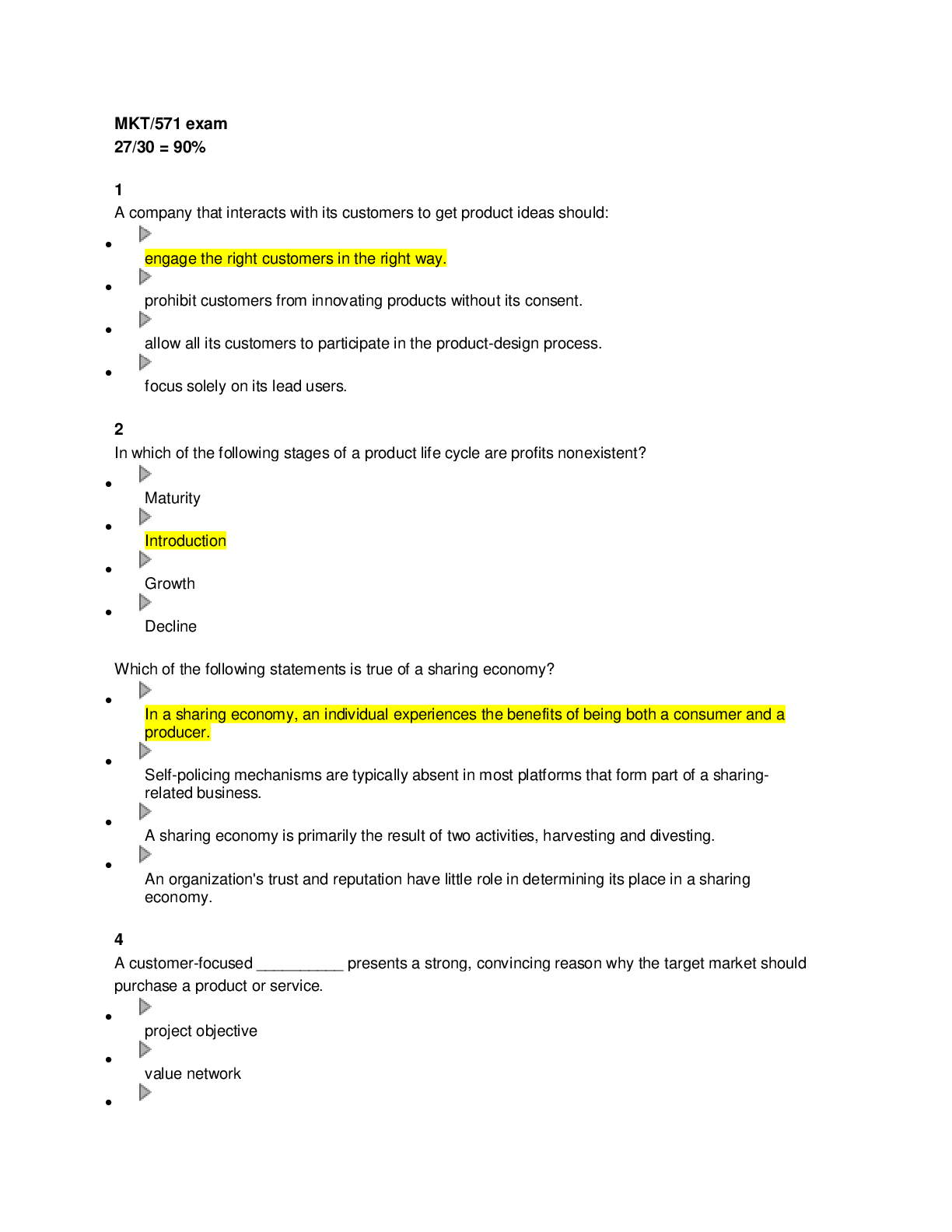NURS 201 Final Exam 2020 (updated) | NURS201 Final Exam 2020
Document Content and Description Below
NURS 201 Final Exam 2020 1. Stress, according to Hans Selye, is best described in the general adaptation syndrome (GAS) and includes three stages. Which one is NOT included in the three stages? A)... Alarm B) Acceptance C) Resistance D) Exhaustion 2. Physiological changes that can be associated with stress include: A) Constricted pupils B) Decreased blood sugar C) Tachycardia D) Bradypnea 3. The most important factor related to stress is: A) Physiological stress impacts all other stressors. B) How we interpret stress determines our body's response to it. C) We have little or no control over environmental stressors. D) Cumulative effects of minor everyday hassles are more stressful than a major life event. 4. An example that may be a cause of reality shock is: A) Taking care of six clients during your first day on the floor B) Getting to lunch every day C) Having the nurse technician do all of the a.m. care D) Charting after finishing each assessment 5. Ways to deal with reality shock include all of the following EXCEPT: A) Finding a mentor B) Leaving the profession C) Exhausting yourself D) Communicating effectively 6. Burnout differs from reality shock in that: A) Burnout occurs early in the nursing profession. B) Reality shock occurs late in the nursing profession. C) Professional frustration is the cause of burnout. D) Low expectations of the job cause reality shock. 7. There are four stages of burnout syndrome according to the text. Which of the following is NOT one of these stages? A) High expectations and idealism B) Optimism and early job satisfaction C) Withdrawal and isolation D) Irreversible detachment and loss of interest 8. Ways to manage burnout include: A) Eating constantly B) Drinking daily C) Keeping to oneself D) Exercising routinely 9. One of the simplest ways to reduce stress is: A) Deep breathing B) Inadequate rest C) Poor nutrition D) Daily exercise 10. A mental way to reduce stress is to: A) Avoid humor B) Ignore social support systems C) Continue the same thought patterns D) Develop realistic expectations 11. Which statement is least likely to be related to stress? A) Stress can be cumulative. B) The impact of stress is the same no matter how you respond to it. C) Perceptions of stress vary with individuals. D) Stress is always self-limiting. 12. What is the least effective way for a new graduate to manage pressures from the first position? A) Develop more effective communication skills. B) Set new professional goals. C) Do not focus on self in order to have more time to work. D) Work with a mentor. 13. A healthy work environment includes an atmosphere of work excitement. Which factor will NOT contribute to a healthy work environment? A) Variable work schedules B) Growth opportunities C) Depersonalization D) A variety of work experiences 1. The first item to include on your résumé is: A) The objective B) Your education C) Your work history D) Personal references 2. A SWOT analysis includes all of the following EXCEPT: A) Strengths B) Weaknesses C) Objectives D) Threats 3. Being a career survivalist means: A) Developing multiple options B) Always searching for more income C) Knowing your current position very well D) Being independent of everyone 4. Skills that are needed for employment do NOT include: A) Oral and written communication skills B) Proficiency in nursing competencies C) Ability to be irresponsible D) Self-discipline 5. It is important to learn about the organization for which you wish to work. You can start by looking at its: A) Mission statement B) Policy and procedures C) Advertisement size D) Salary ranges 6. The information not needed in your résumé is: A) Qualifications B) Educational experiences C) Personal references D) Work history 7. The best résumé is: A) Crammed with everything about you B) Printed on brightly colored stationery C) Lean and to the point D) In a paragraph format 8. In the interview process, you should: A) Be vague about experiences B) Not exaggerate your knowledge and skills C) Talk in abstract terminology D) Defend your ability to do this job 9. In citing your skills on your résumé do NOT include: A) Management and leadership positions B) Problem-solving ability C) Volunteer experience D) Personal issues about previous work experiences 10. Recommendations for career success from experienced nurses include all of the following EXCEPT: A) Find a mentor. B) Recognize that health-care is a business. C) Communicate effectively. D) Don't take risks in the workplace. 11. In searching for a new position you should do everything EXCEPT: A) Review the philosophy of the organization. B) Speak with nurses in the organization. C) Request the organizational chart. D) Call the nursing office regarding salaries. 12. The following information should be included on your résumé: A) Accurate spelling and grammar B) Family information C) Clear objective D) Education and experience 13. Your resume should NOT include skills related to: A) Leadership B) Teamwork C) Volunteer activities D) Childcare arrangements The employer is responsible for providing a safe working environment by: A) Driving all employees to work B) Following the OSHA guidelines C) Teaching employees to use their back muscles for lifting clients D) Allowing the recapping of contaminated needles 2. Threats to the employee do NOT include: A) Potentially lethal chemicals B) Exposure to infectious materials C) Recapping safety devices in each room D) Radioactive materials in open containers 3. Ways to reduce risk of infection to yourself and others include: A) Not going into the client's room B) Wearing gloves whenever you go into a client's room C) Placing all clients in isolation rooms D) Good hand-washing practices 4. According to OSHA, employers must provide all of the following EXCEPT: A) Tuberculosis testing and hepatitis B vaccine B) Client rooms that are painted with pleasant colors C) Protective equipment, such as gloves, gowns, and masks D) Immediate treatment after exposure to bloodborne pathogens 5. Circumstances surrounding health-care work that contribute to workers' susceptibility to homicide and assault include: A) Working in low-crime areas B) Having good hospital security C) Experienced staff to deal with problems D) Working in large groups 6. The American Nurses Association (ANA) recommends four tactics to fight sexual harassment. The one that is NOT considered an ANA recommendation is: A) Reporting the incident to your supervisor B) Ignoring the situation and hoping it goes away C) Documenting the incident to keep the facts fresh in your mind D) Seeking support from your friends, relatives, and state associations 7. You have just started working in a busy ER. Recently you have developed hives, nasal congestion, and conjunctivitis. You are most likely experiencing: A) An allergic reaction to latex gloves B) A severe reaction to the ER environment C) A rhinitis reaction to the general environment D) An allergic reaction to the hospital gown 8. One way in which you can decrease the chance of a back injury to yourself is: A) Asking for help B) Not exercising C) Refusing transfer equipment D) Missing the class on back-muscle strengthening 9. Narcotics have been missing from the narcotic count every other weekend and on Fridays. Several of the same employees work those shifts, and Sue Ellen is often late and has been very “touchy” lately. You have tried to talk with her, but she is not willing to talk with you. Your first step should be to: A) Notify the State Board of Nursing. B) Discuss the situation at a staff meeting. C) Bring your observations to your nurse manager. D) Confront Sue Ellen while she is drawing up medications. 10. Workplace issues currently under discussion by the American Nurses Association do NOT include: A) Mandatory overtime B) Rotating shifts C) Staff development opportunities D) Staffing ratios 11. The agency responsible for protecting the worksite against terrorism is: A) ANA B) OSHA. C) CDC D) NIOSH 12. OSHA requires employers to protect employees by: A) Providing annual training B) Giving free hepatitis B vaccines C) Maintaining universal precautions D) Maintaining staffing ratios 13. The American Nurses Association recommends that questionable practices in the workplace be reported. These may NOT include: A) Endangering a client's health B) Abusing authority C) Violation of rules or standards of practice D) Being short-tempered with others The role of the manager includes: A) Interpersonal, informational, and decisional actions B) Extroverted personality, hidden agenda, and personal gain C) Introversion, asking questions, and inability to take action D) Extreme prejudice, being unknowledgeable, and being uncaring 2. Sally meets with all the staff to get input on the governance of the unit. Her management style is most likely: A) Autocratic B) Participative C) Directive D) Permissive 3. During a code Sue begins giving orders to the staff. Her management style at this time is: A) Nondirective B) Permissive C) Controlling D) Participative 4. An example of a human relations–oriented manager is one who: A) Motivates employees to work to their highest potential B) Uses control rather than guidance C) Assumes close supervision over staff development D) Implements punishment rather than rewards 5. Which of the following qualities would be detrimental to effective nursing management? A) Leadership B) Clinical expertise C) Business sense D) Minimum communication 6. Michelle believes that her employees operate from the Theory Y philosophy. Based on this, how would she assist them in developing a scheduling plan for the unit? A) Send a completed schedule for 2 months out over e-mail. B) Ask for a committee of volunteers to develop the schedule. C) Meet with each employee to get his or her input about the best scheduling plan. D) Delegate scheduling to her assistant nurse manager. 7. Nancy has been working as an RN in long-term care for 4 months. She has been offered the evening supervisor position at a local nursing home. The salary is attractive. What should be her main consideration prior to accepting this position? A) Her clinical expertise, business sense, and leadership skills. B) Staffing ratios and number of RNs on the evening shift. C) Vacation, sick time, and tuition reimbursement. D) Mission and philosophy of the facility. 8. Which of the following actions would be typical for a manager who adheres to the scientific management approach? A) Reads research studies on management B) Stays in touch with his or her feelings C) Carefully works out the time each nursing task should take D) Allows staff to develop and enforce their own holiday schedule 9. Servant leadership is best described as: A) An “employees first” attitude B) Emphasis on serving the patient C) A laissiz-faire approach D) Multi-tasking as much as possible 10. Which of the following is an example of the decisional activities of a manager? A) Providing leadership B) Encouraging continuing education C) Coaching employees D) Completing staff evaluations 11. What is the “essence” of management? A) Providing close supervision B) Getting work done through others C) Constant monitoring of unit expenses D) Staff development 12. A new graduate has been offered a nurse manager position. What is the graduate's best response? A) “Thank you, but I'm not ready to be a manager.” B) “When can I start?” C) “What is the starting salary?” D) “Tell me what the benefits of the positions are.” Wilhelmina, an RN for over 6 years, had her license suspended because an audit of her continuing education credits showed that she had not met the mandatory course requirements. The Board of Nursing has the ability to do this based on: A) Case law B) Administrative law C) Civil law D) Statutory law 2. Jeremy graduated from an associate degree nursing program 2 years ago. He is brought before the State Board of Nursing for offering to give physicals for summer camp for $25. Because Jeremy has violated the Nurse Practice Act in his state, he is charged with committing a: A) Misdemeanor B) Felony C) Civil law D) Common law 3. Which of the following would not be considered one of the elements for a negligence claim? A) Duty B) Breach of duty C) Spontaneous duty D) Harm 4. Lorena, an RN, is flying from Los Angeles to New York. The flight attendant requests the help of a nurse or physician if one is on board. Lorena approaches the flight attendant and asks if she can assist. Lorena is protected by the Good Samaritan Act because the act states that a licensed health-care provider can: A) Administer care any time B) Provide care that any other prudent individual with the same education would provide C) Provide the same care as a paramedic D) Provide care outside the scope of her practice as long as she knows how to perform the required procedure 5. Larry was brought to the hospital by two police officers. He was combative and verbally abusive. After waiting for over an hour, Larry tells the nurse he is leaving. The nurse removes Larry's clothes from the room, leaving him only in his underwear. The nurse may be charged with: A) Cruel and unusual punishment B) Slander and libel C) False imprisonment D) Assault and battery 6. Jose and his girlfriend are driving on the highway and witness a motor vehicle accident. He calls 911 and pulls over to the side of the road. He immediately begins to assess the victim to determine what he can do until the paramedics arrive. His girlfriend says, “This guy can't give you permission to help him; maybe you should just leave him alone.” Jose explains that he has implied consent. Implied consent is assumed when a client: A) Sees a physician or nurse by appointment in the office or clinic setting B) Arrives in the operating suite C) Is admitted to the hospital D) Is treated at the scene of an accident 7. Three nursing students are in the elevator and overhear Evan, one of the staff nurses, discussing his neighbor who was hospitalized last night for liver failure. Evan told his colleague that a mutual friend told him that the neighbor was “known for liking his brandy.” A family member was in the elevator and also overheard the conversation. Evan may be charged with: A) Slander B) Libel C) Fraud D) Breach of confidentiality 8. Juliana, an RN, is caring for Mary Lewis, 80 years old. Ms. Lewis falls and injures herself. Which of the following actions should Juliana take to decrease her liability? A) Document the incident carefully on an incident report form. B) Chart the facts surrounding the client's fall, condition, and follow-up care. C) Do not document anything about the fall. D) Just tell the on-coming nurse that Mary fell. 9. An action that can lead to a malpractice suit would be: A) Assessing a client more than once per shift. B) Listening to the physician explain the benefits and risks of a procedure as they are being explained to the client. C) Reporting that he or she has witnessed a coworker using controlled substances when working. D) Altering a client's record. 10. Mr. Phillipe has suffered a stroke. His daughter brings DNR and power of attorney documents to the hospital. The purpose of the DNR is to: A) Document the terminal nature of the client's condition B) Allow an alternative to the universal standing order to provide cardiopulmonary resuscitation to all clients C) Provide an opportunity for the client, family, and caregivers to discuss the nature of the client's condition and the best possible course of action if the client has a cardiac arrest D) Provide legal protection for nurses who believe a client should not be resuscitated 11. Marie, an RN, accompanies the surgeon to Ms. Allen, a diabetic with gangrene of the lower left extremity. The surgeon explains to Ms. Allen that he will perform a below-the-knee amputation that will remove the infection. He will give her some antibiotics, and she will probably go home in a few days. After the surgeon leaves, Marie brings in the consent forms and asks Ms. Allen to tell her what the surgeon said. Ms. Allen states, “Oh, he is going to remove the infection and give me antibiotics and then I can go home. I feel so much better now because my other doctor told me they were going to cut off my leg!” Based on this information, Marie's next step should be to: A) Have Ms. Allen sign the consent form B) Draw a picture of a below-the-knee amputation for Ms. Allen C) Tell Ms. Allen that she did not hear what her doctor told her D) Call the surgeon and explain the situation to him 12. Glenn is an RN on a busy medical-surgical unit. He comes to work today for his usual shift after working a double shift yesterday. At the end of this day, two RNs call in, and the nurse manager tells Glenn he needs to stay and cover the next shift. Glenn may refuse to accept an assignment if: A) He is being asked to care for too many difficult clients B) He believes his assignment is unsafe C) He is being asked to work overtime D) He believes there are not enough nurses to work with him 13. The health-care provider orders an injection for a pediatric client. The client's legal guardian refuses to allow the nurse to administer the medication, however, the nurse proceeds to administer the injection. Legally, the nurse has committed: A) An assault B) A battery C) An invasion of privacy D) False imprisonment 14. After administering an incorrect dosage of a medication the nurse realizes that too little medication was given to the client. The nurse then administers a second dose in order to give the correct dosage. Legally, the nurse must: A) Not tell anyone about the error B) Document that the correct medication was administered C) Document the error in the nursing notes D) Both A and B 15. A nursing student is preparing for the NCLEX. Which of the following activities would be most appropriate 2 days before the student is to take the examination? A) Pack a bag of items that may be needed during the test. B) Map out the route to the exam site. C) Eat a diet high in fats and carbohydrates. D) Both A and B 1. Which of the following would be considered an extrinsic value? A) Food B) Water C) Money D) Shelter 2. Mrs. Chou has been suffering from senile dementia Alzheimer's type for over 5 years. Her family has kept her at home, and each member has participated in her care. The community health nurse has been supporting the family in this effort. Recently, Mrs. Chou has stopped interacting with the family, refuses to eat, and sleeps a great deal. The family is conflicted over how to care for their dying mother. The nurse understands that her role in this conflict is to: A) Say nothing; this is a family issue. B) Speak with the members individually and persuade them to do “what is best for their mother.” C) Discuss the conflicting opinions with the physician. D) Persuade the family members to meet together to express their feelings to one another. 3. Mr. Jeremy received the wrong dose of a narcotic, and the error was caught during the shift's narcotic count. The nurse performing the count was not the nurse who signed out the medication. The nurse's next action should be to: A) Speak about the error with the nurse who gave the medication. B) Report the medication error without first consulting the nurse who signed out the medication. C) Call the nurse manager and ask her to handle the situation. D) Write out an incident report. 4. A family insists that their father, Alvin Shure, 68 years old, not be told he is dying of lung cancer. While hanging his IV medication, Mr. Shure asks the nurse, “I never had a medication in a bag like that. What is it for?” The nurse knows that the medication is an antineoplastic agent. The best response by the nurse is: A) “This is a new drug your physician ordered.” B) “This medication is often used in the treatment of cancer.” C) “This medication has more than one use, and I am not sure why you are receiving it.” D) Request that the family tell him why he is getting the medication. 5. Mrs. Brandon has breast cancer. She was diagnosed quite late in the illness and is terminal. She knows that she has breast cancer and has undergone a mastectomy, however, no one has told her the extent of her illness. The nurse comes in to change her dressings and hang her medication. Mrs. Brandon looks at the nurse and asks, “What is happening to me? Why won't anyone explain what is happening to me?” Her husband, Mike, and two daughters look at the nurse and shake their heads, “No.” The best response by the nurse is: A) “You seem distressed; let's talk about your concerns.” B) “You know you are ill; let's talk about dying.” C) “You seem concerned about your health; talk to the doctor when he comes in to see you.” D) “Mike, you need to talk to your wife and tell her what is really happening.” 6. Nonmaleficence means: A) Freedom to make decisions for oneself B) Doing no harm, either deliberately or unintentionally C) Doing good for the benefit of others D) Treating everyone equally, regardless of gender, race, religion, or disease 7. The role of ethics committees is to: A) Resolve ethical dilemmas B) Prevent the physician from getting the institution into legal confrontations C) Establish guidelines to eliminate ethical dilemmas D) Provide appropriate guidance for the health-care team, family members, and the client 8. Beneficence means: A) Freedom to make decisions for oneself B) Doing no harm, either deliberately or unintentionally C) Doing good for the benefit of others D) Treating everyone equally, regardless of gender, race, religion, or disease 9. Yana and Jonathan carry the gene for a rare genetic disorder that causes severe mental retardation and physiological problems incompatible with life. Yana has conceived twice, however, both children had the disorder and died within 2 months after birth. Yana has come to the fertility clinic. While her history is being taken, Yana says to the nurse, “After you harvest my eggs and fertilize them with Jonathan's sperm, throw out all the bad ones, and give me only the good ones.” The best response made by the nurse is: A) “Now, that's not very nice.” B) “We never implant bad embryos; we have a reputation to keep.” C) “You have to take the good with the bad.” D) “Let's talk about your concerns regarding the health of these embryos.” 10. A nurse working in the critical care unit is described as being an excellent friend and critical thinker. This would be considered an example of: A) Virtue ethics B) Moral ethics C) Nursing ethics D) Power ethics 11. A common theme in both the ANA and the ICN code is: A) A focus on the importance of compassionate care B) Nurses making decisions for clients C) Promoting nursing practice acts D) Maintaining continuing education 12. A new graduate is considering working at a health-care institution that focuses on core values. It is important for the new graduate to: A) Read the organization's mission and philosophy B) Develop a new set of values that blend with the organization C) Speak with other nurses who work in the institution D) Both A and C 1. Sources of coercive power come from which of the following? A) Responsibility B) Recognition C) Expertise D) Punishment 2. The structure of many organizations is the: A) Traditional approach B) Organic structure C) Decentralized approach D) Network structure 3. Empowerment is psychological and includes a feeling of: A) Control B) Loss C) Effectiveness D) Quantity 4. Empowerment occurs more often with: A) Authoritarian management B) Shared governance C) Laissez-faire governance D) Autocratic management 5. Sharing decision-making responsibilities may be difficult for some managers for which of the following reasons? A) They believe that empowered staff members have higher levels of job-related tension. B) There is inadequate staffing on the unit. C) There is a lack of time and situational support. D) They may be reluctant to give up their control. 6. For registered nurses to enhance their expertise and sense of empowerment, certain activities are necessary. Which of the following will least prepare registered nurses for enhancing their competence? A) Actively participating in interdisciplinary team conferences B) Attending professional organization meetings C) Refraining from participating in research projects in a clinical specialty D) Returning to school to earn a higher degree in nursing 7. The term “shared governance” describes: A) Informal ways in which access to opportunity is made available to staff B) Staff nurses' inclusion in decision-making through representation in governing practice and management issues C) Nurses' involvement in decision-making at the administrative level D) A shared staffing on various levels to serve the needs of the institution 8. A clinic run by volunteer doctors and nurses belongs in which of the following categories? A) Voluntary for profit B) Publicly supported C) Not for profit D) Governmental agency 9. The most obvious aspect of organizational culture is/are: A) The unwritten rules B) The employee handbook C) The care environment D) The organizational climate 10. Which of the following is a common goal for a health-care organization? A) Survival B) Limited existence C) Cooperation with the competition D) Downsizing 11. Staff members at the bottom of the organizational hierarchy have: A) No power B) No power and no authority C) High authority and high power D) Little authority, but some power 12. A positive aspect of hierarchy is: A) Few policies or practices B) Consistent operation C) Flexibility D) Promotion of creativity 1. In dealing with conflict, it is important to approach it in a(n): A) Competitive manner B) Destructive manner C) Cooperative manner D) Ambivalent manner 2. Conflict can occur when there is: A) Decreased workloads B) Acceptance of cultural differences C) A secure work environment D) Tension between groups 3. When issues and problems arise that cannot be resolved through discussion, the next step might be: A) Negotiation B) Discussion C) Problem-solving D) Arguments 4. Creativity is especially important in which phase of problem-solving? A) Identifying the issue B) Generating possible solutions C) Evaluating the solutions D) Implementing the solution 5. A problem-solving process used in the nurse-client relationship is known as: A) Case management B) Nursing process C) Evaluation techniques D) Remediation theory 6. What is the goal of conflict management? A) A conflict-free workplace B) Resolving conflicts C) Avoiding conflicts at any cost D) Problem reduction 7. Problem resolution, as opposed to negotiation, is appropriate in which of the following situations? A) Complex, widespread disagreement B) Highly charged situation C) Political issue D) Interpersonal misunderstanding 8. Ground rules are set during a negotiation in order to: A) Prevent escalation of the conflict B) Restrict freedom of discussion C) Clarify the source of the conflict D) Reduce formality 9. The best indication that a conflict is resolved is when: A) Everyone falls silent. B) The group that was correct is the winner. C) Issues remain a concern. D) Everyone is satisfied with the solution. 10. Collective bargaining is best described as: A) An informal problem-solving process B) A generally informal process involving all staff members C) A formal procedure governed by labor laws D) Focused on interpersonal relationships [Show More]
Last updated: 1 year ago
Preview 1 out of 45 pages
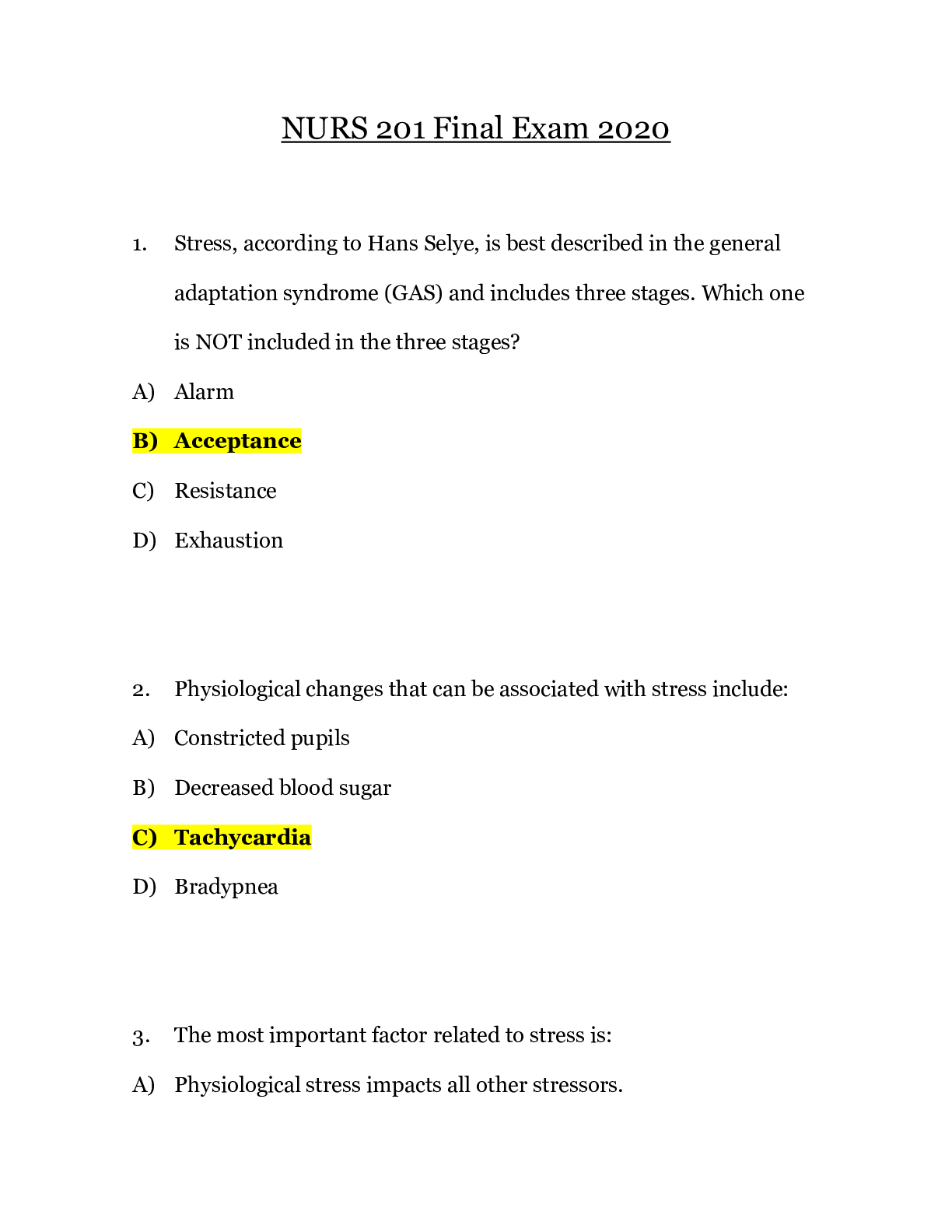
Buy this document to get the full access instantly
Instant Download Access after purchase
Add to cartInstant download
We Accept:

Reviews( 0 )
$14.50
Document information
Connected school, study & course
About the document
Uploaded On
Oct 20, 2020
Number of pages
45
Written in
Additional information
This document has been written for:
Uploaded
Oct 20, 2020
Downloads
0
Views
38

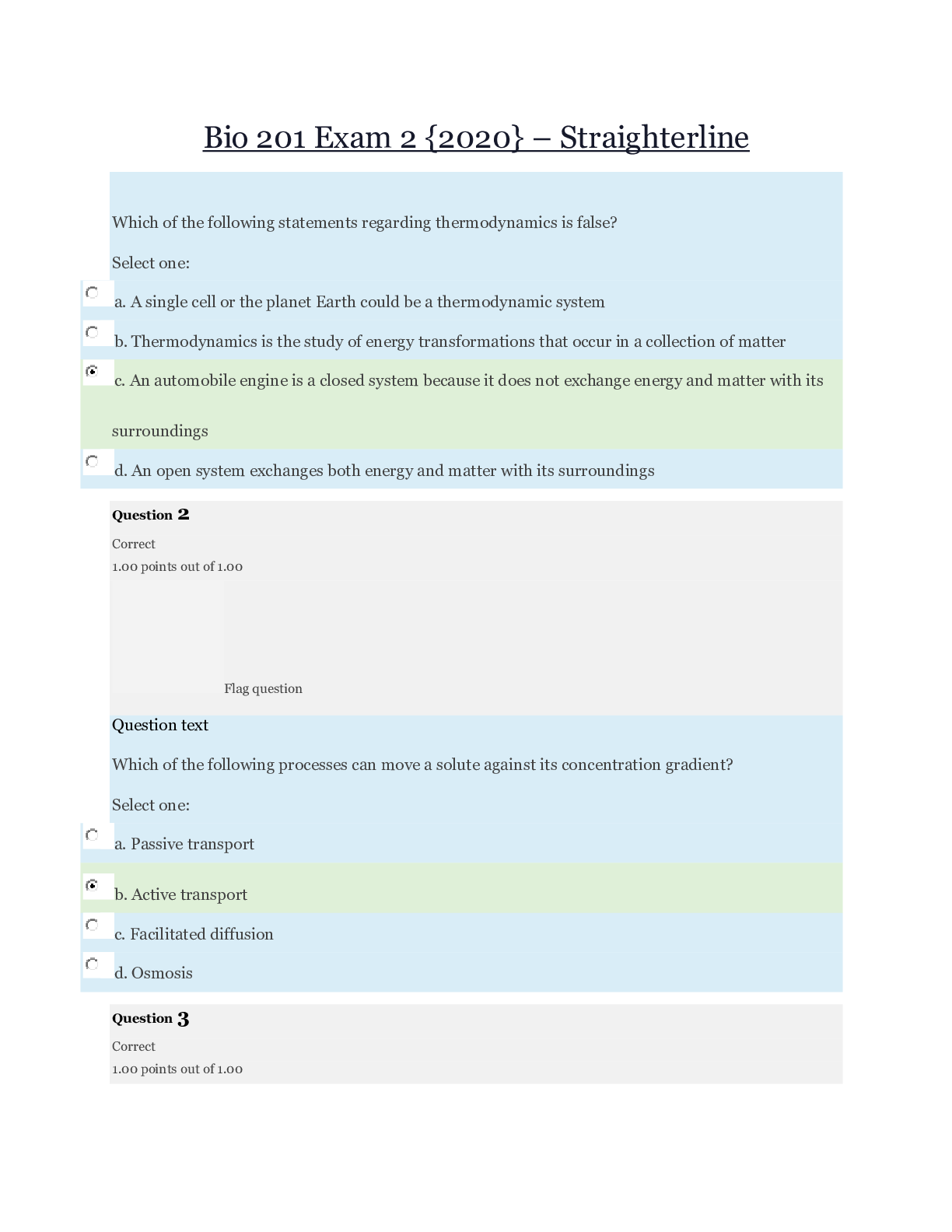
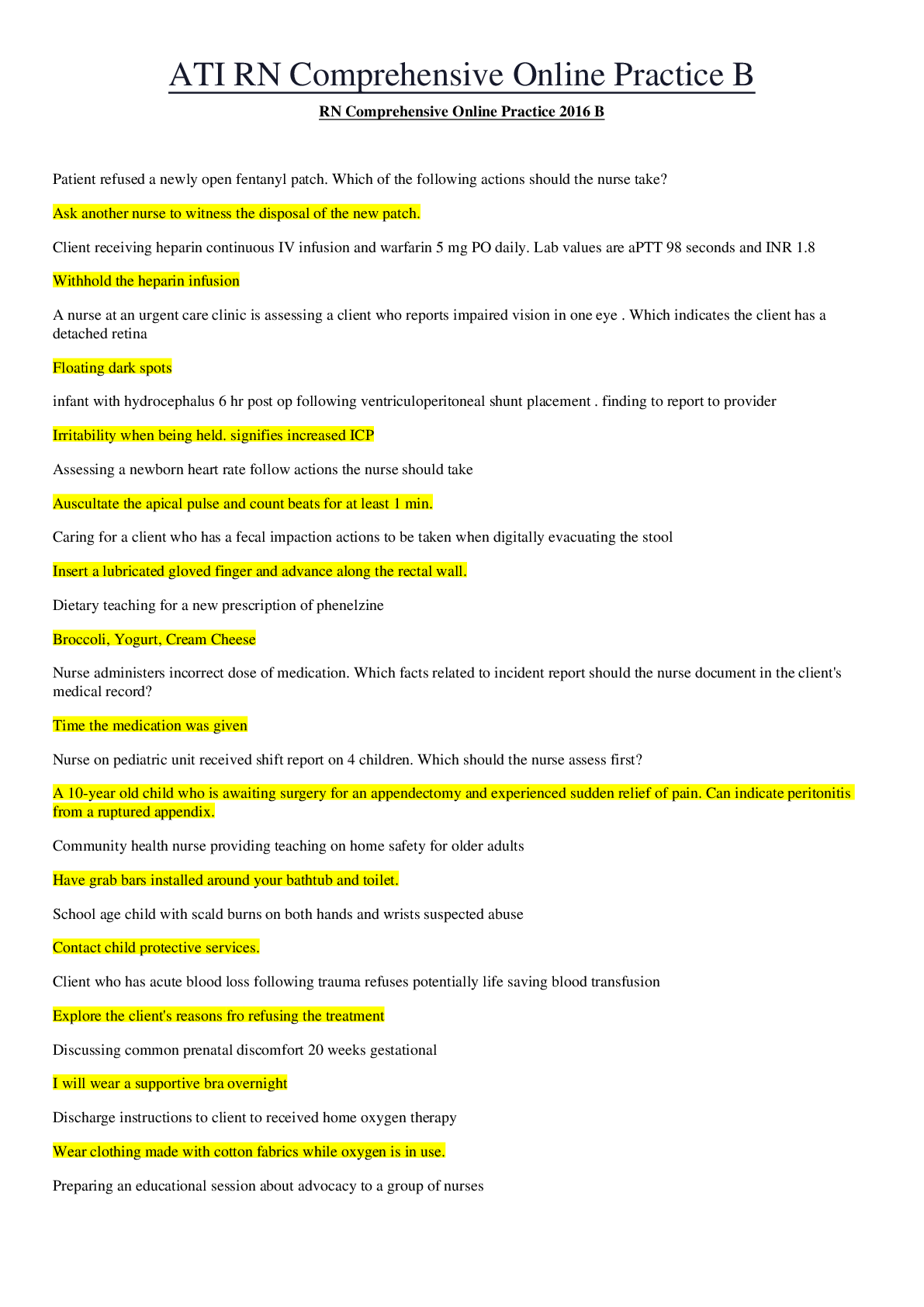
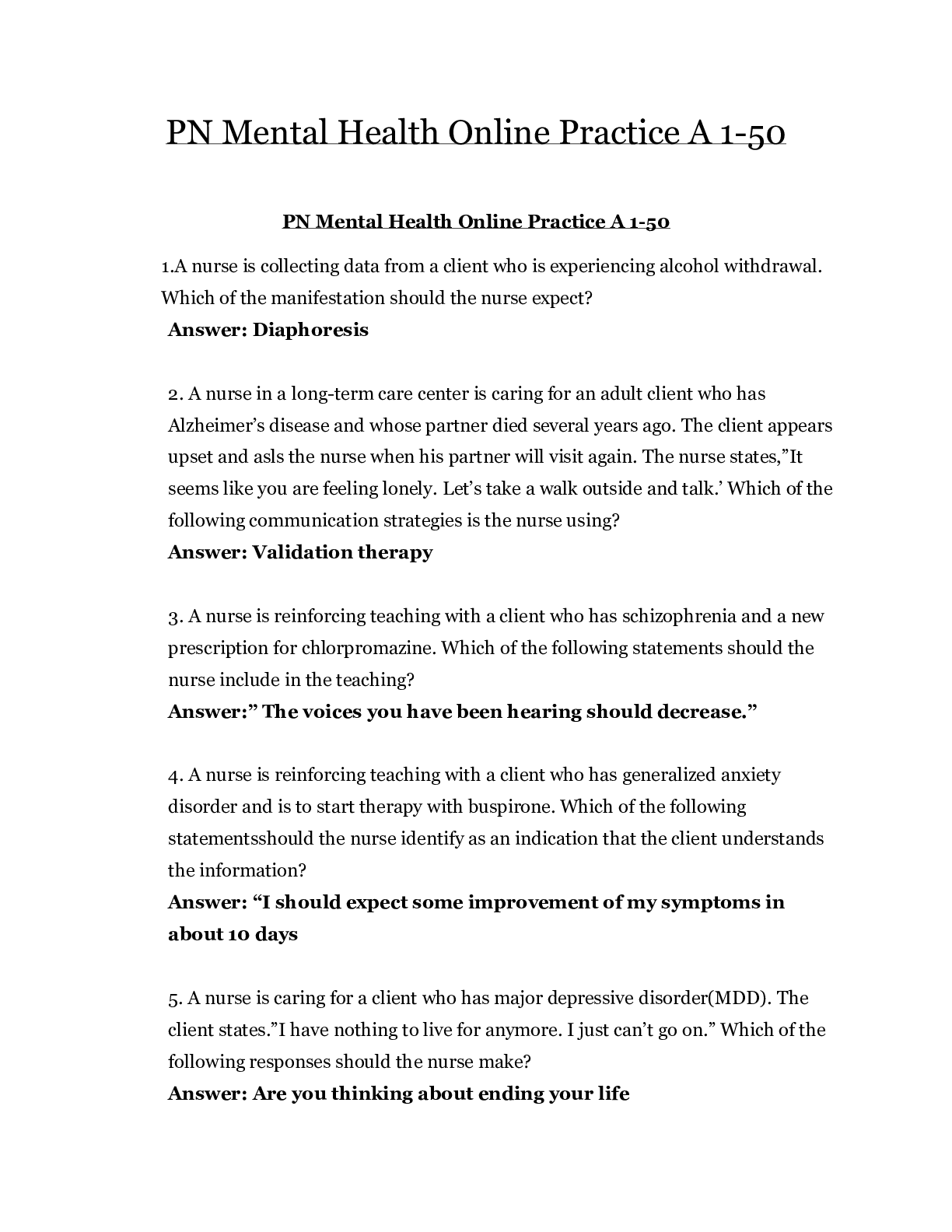
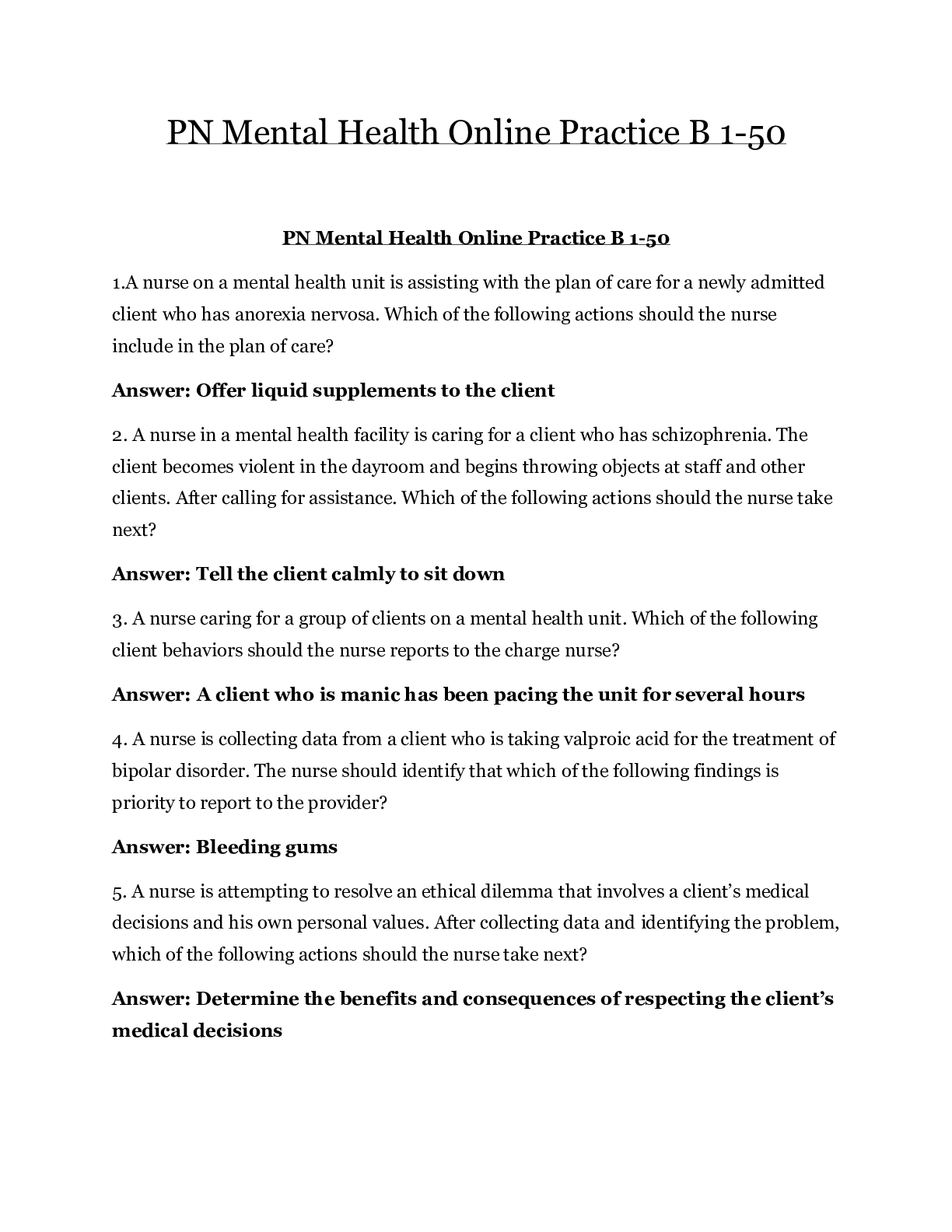
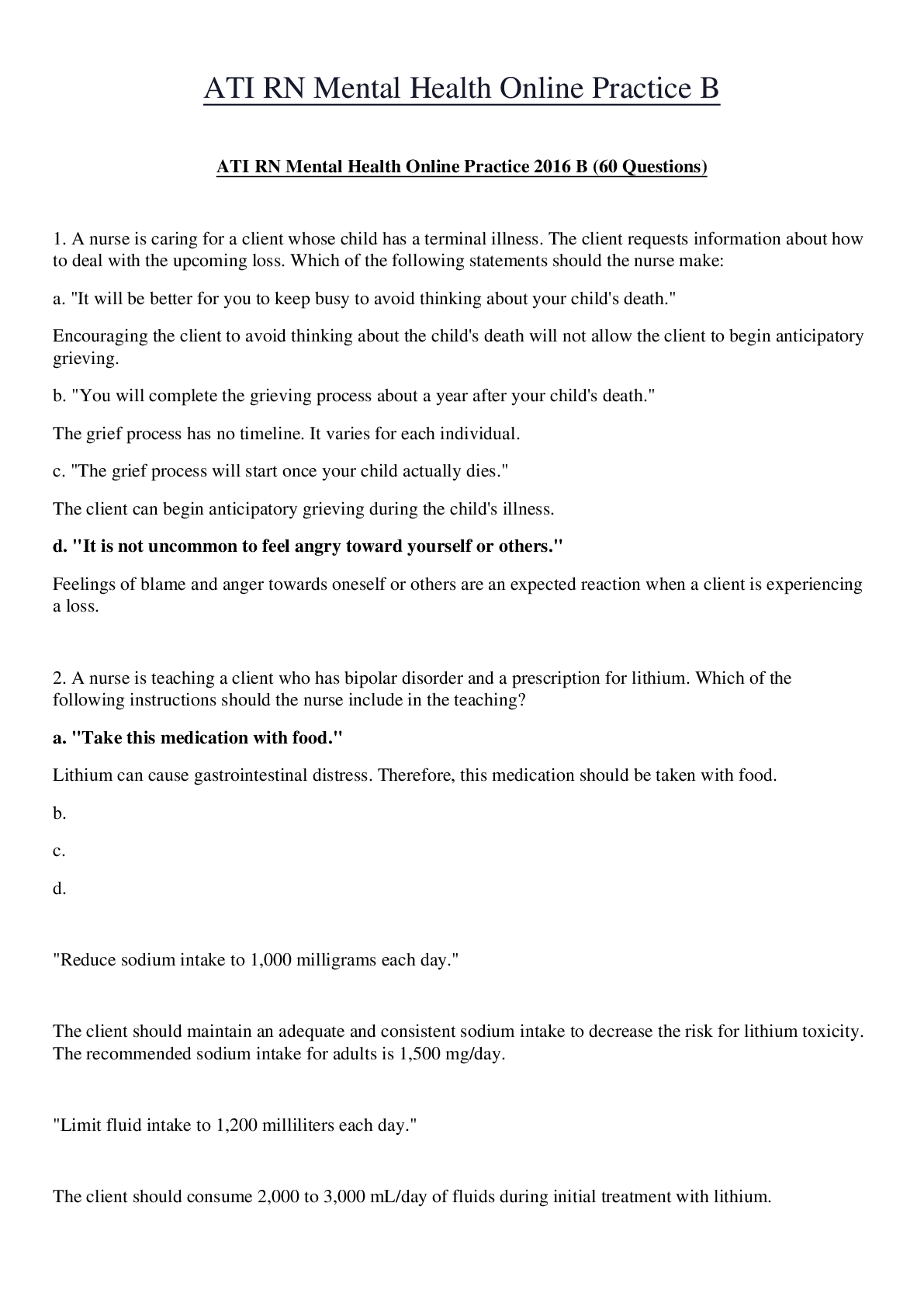
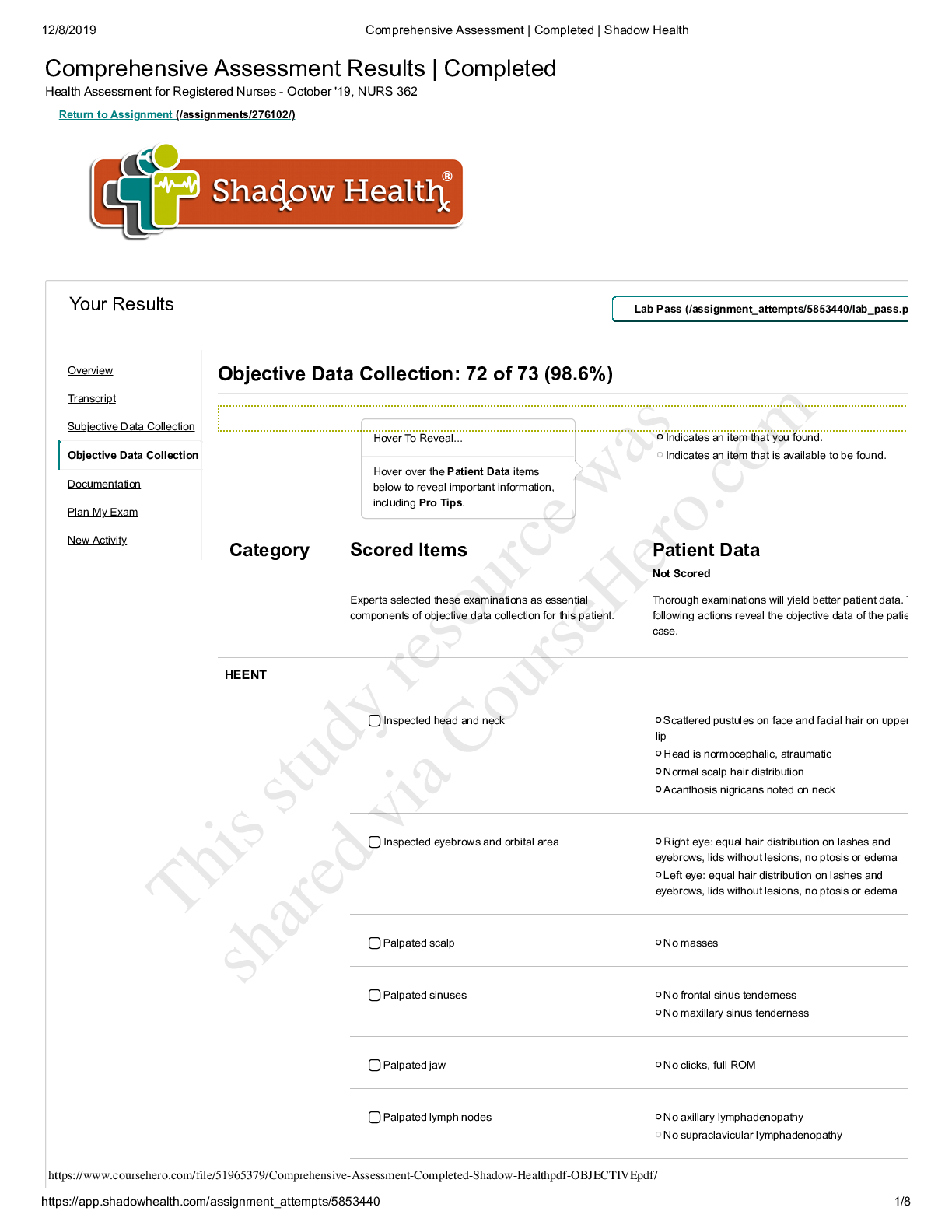
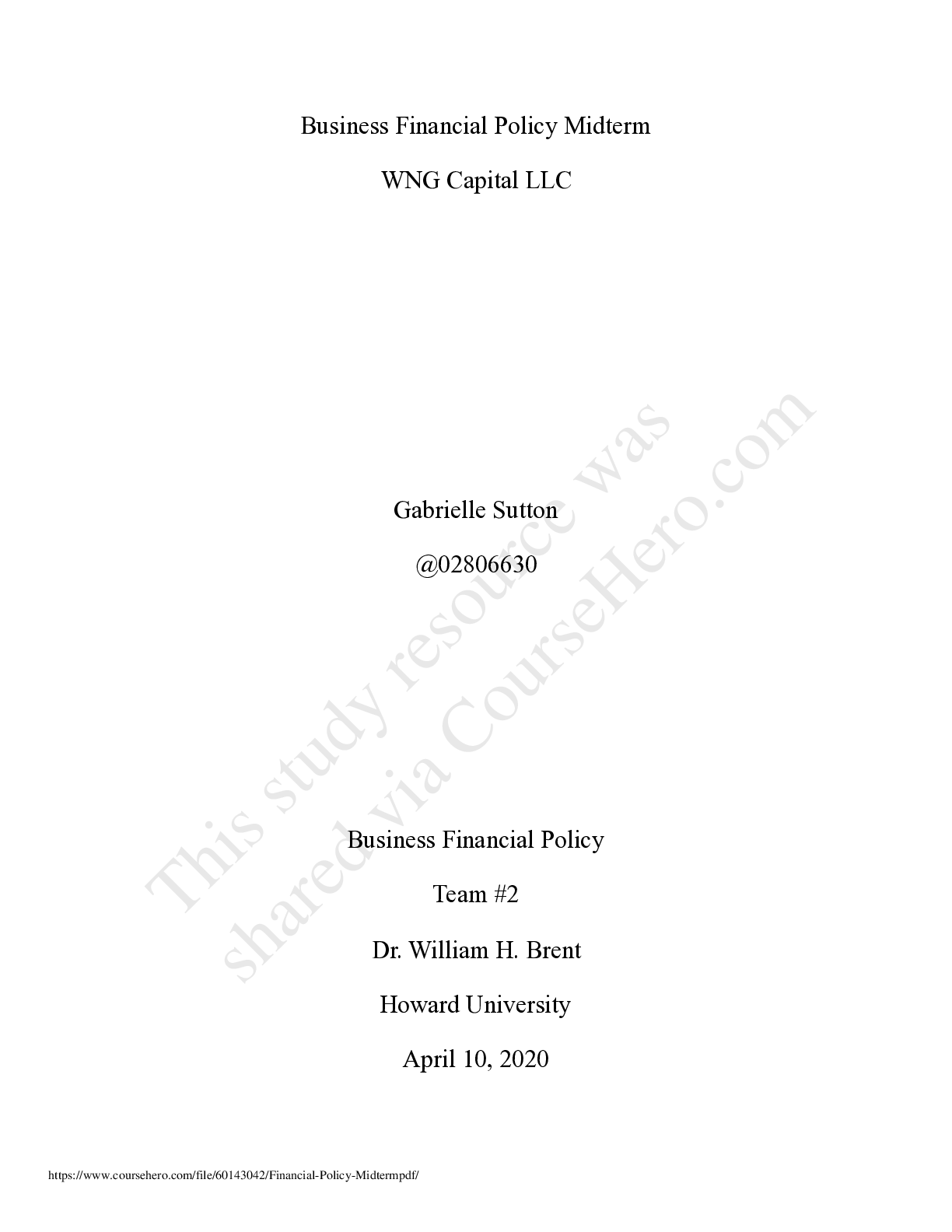

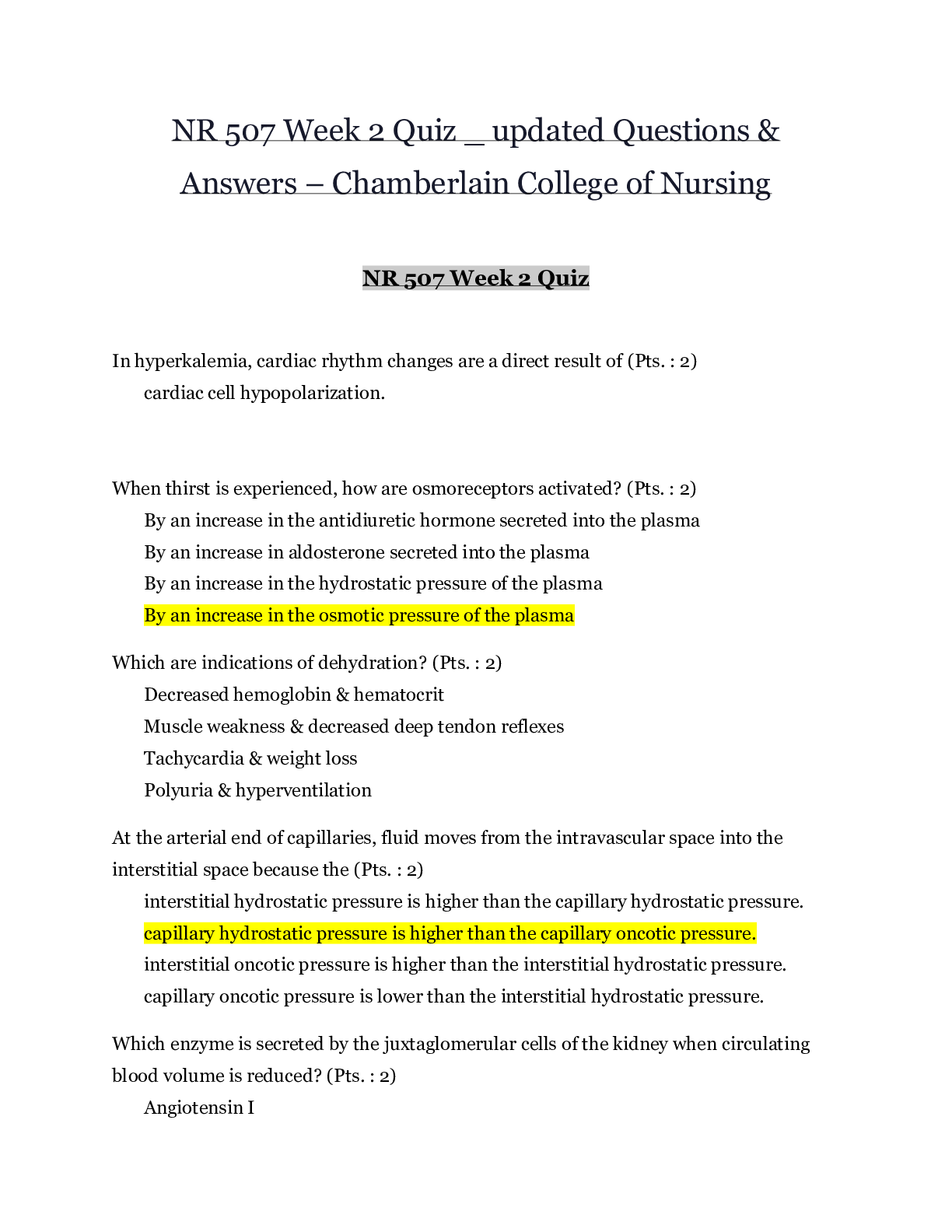
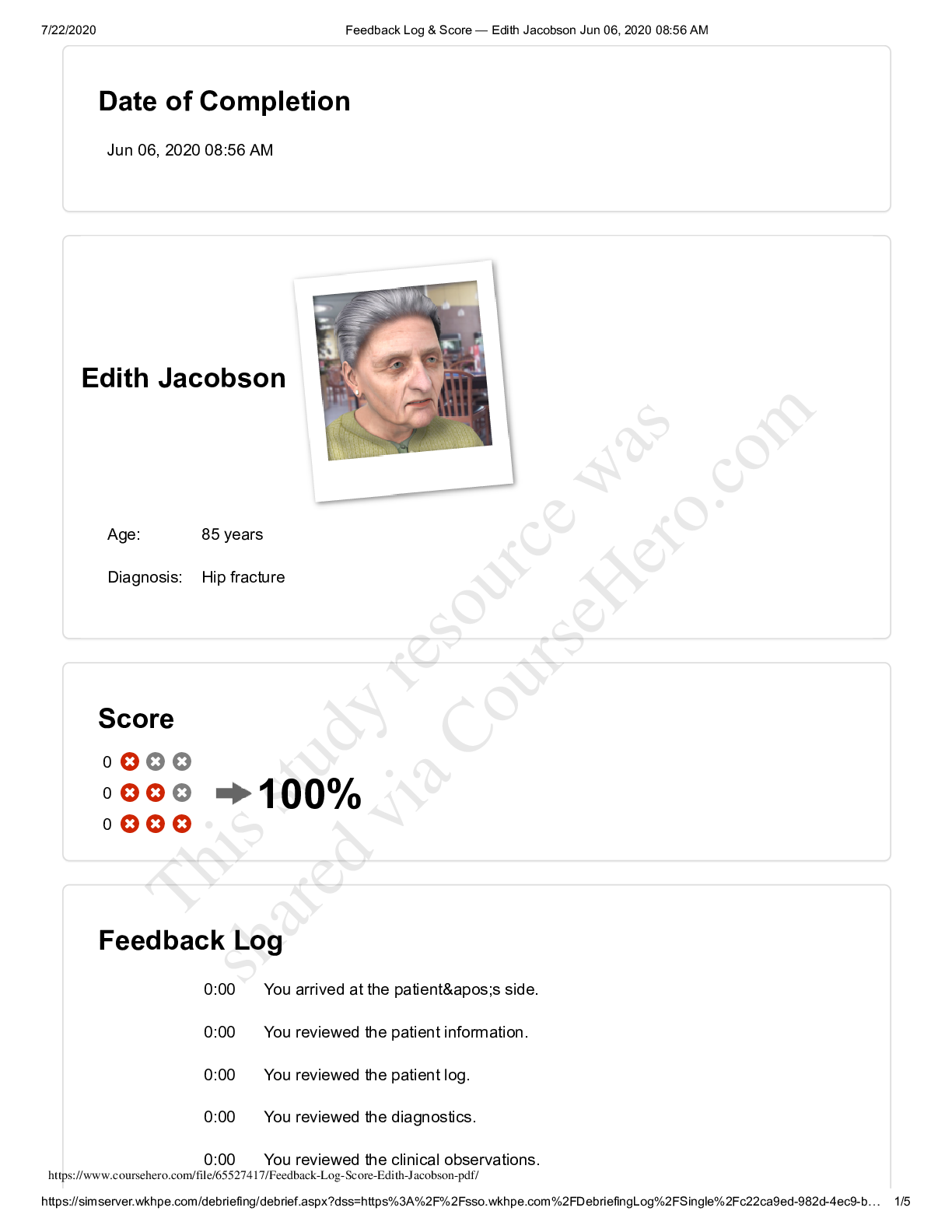



.png)
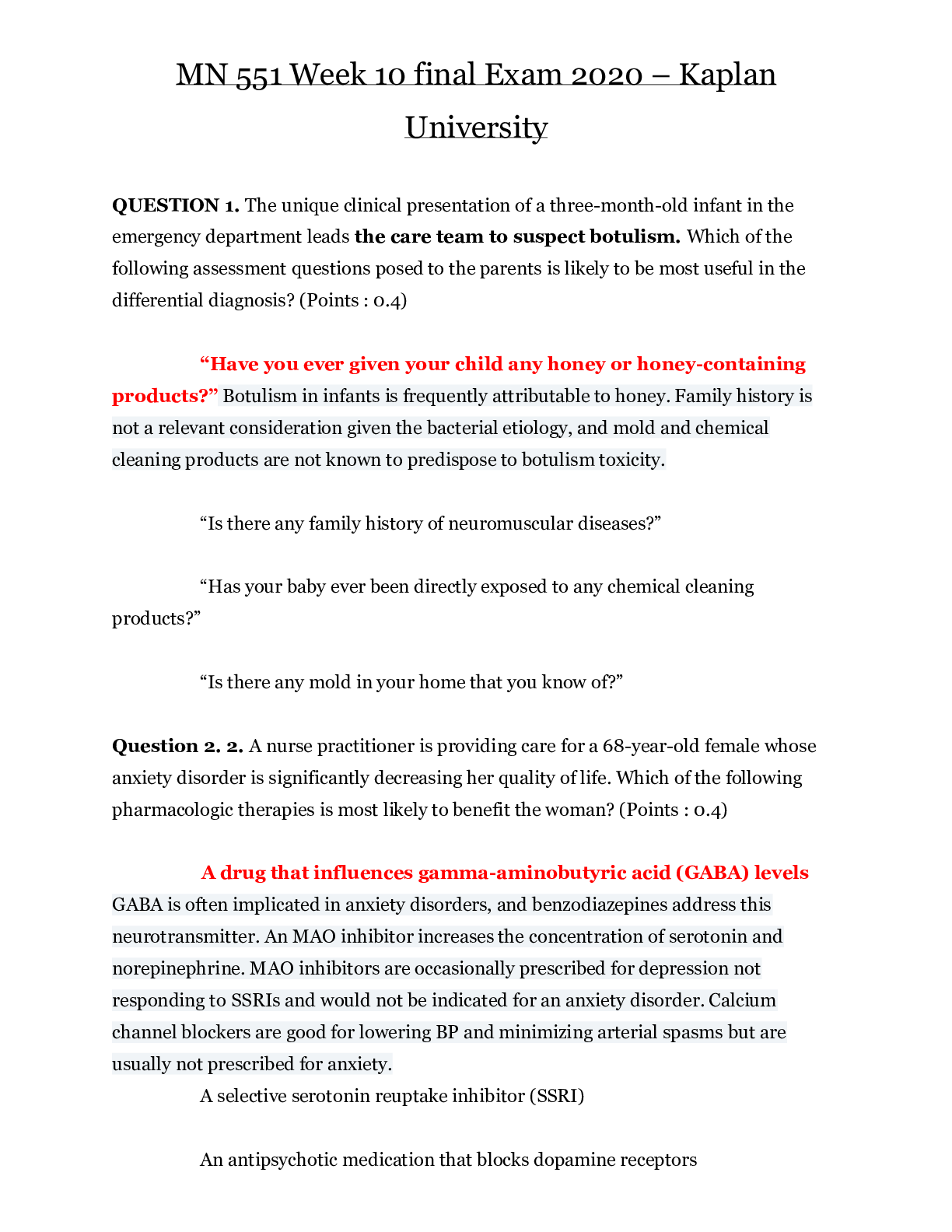
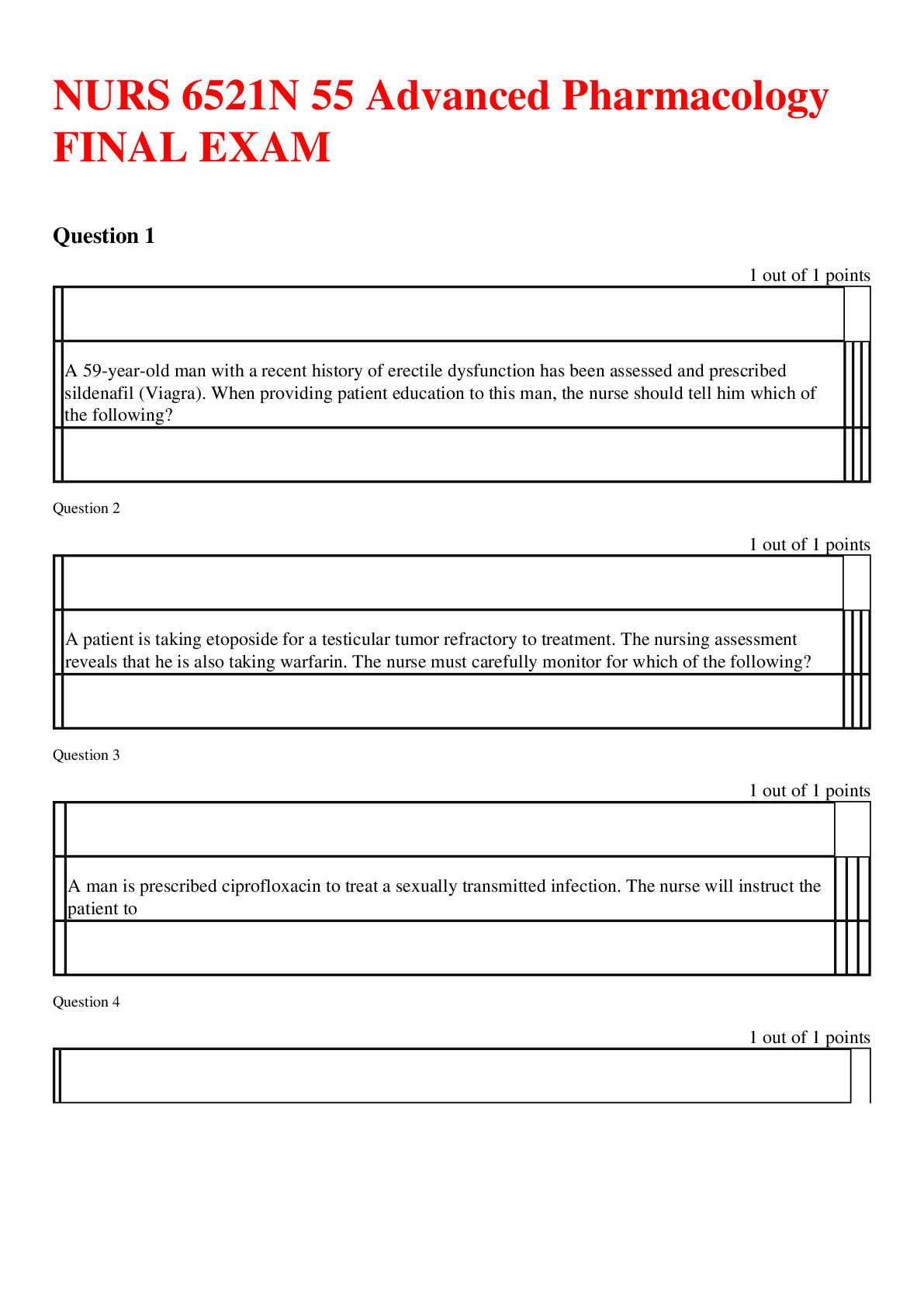
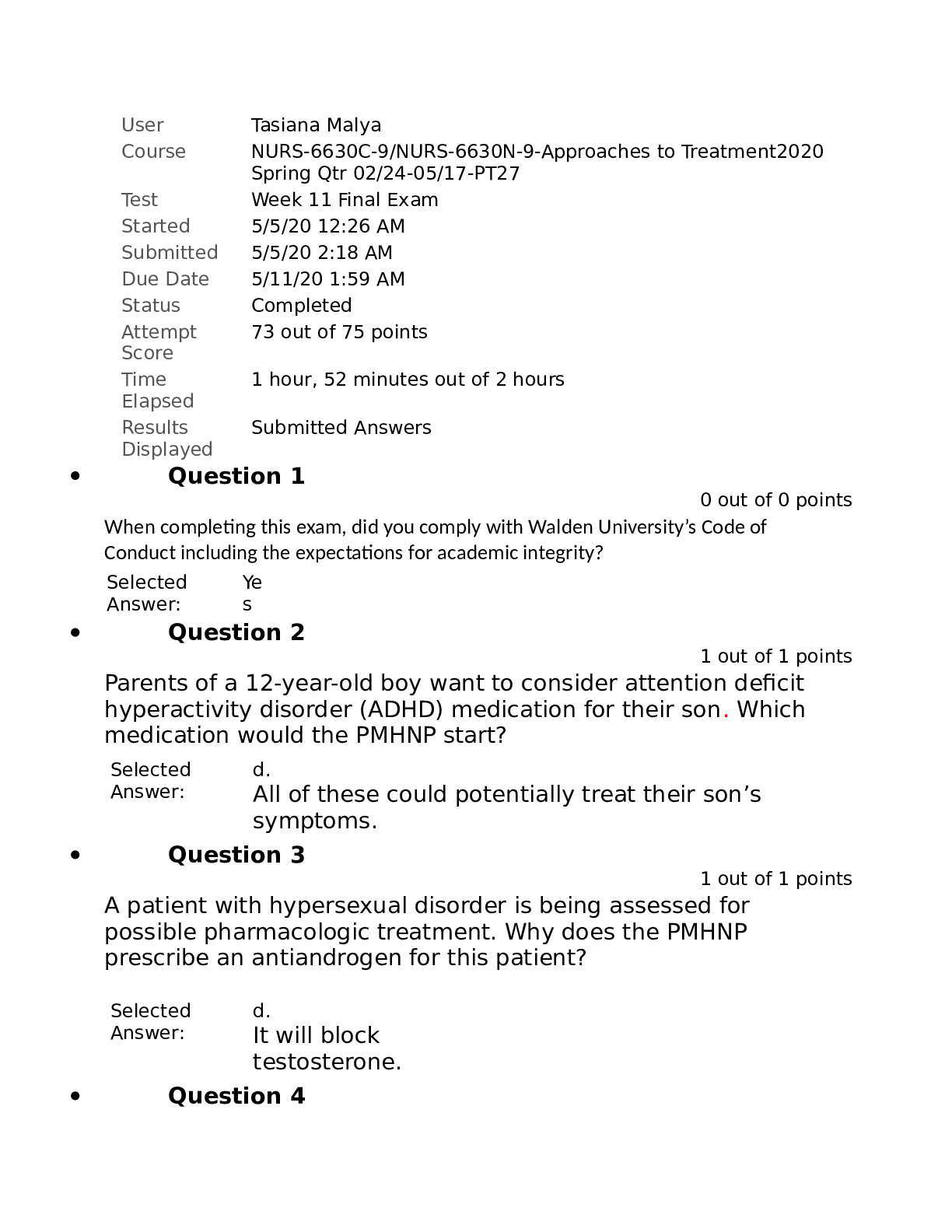
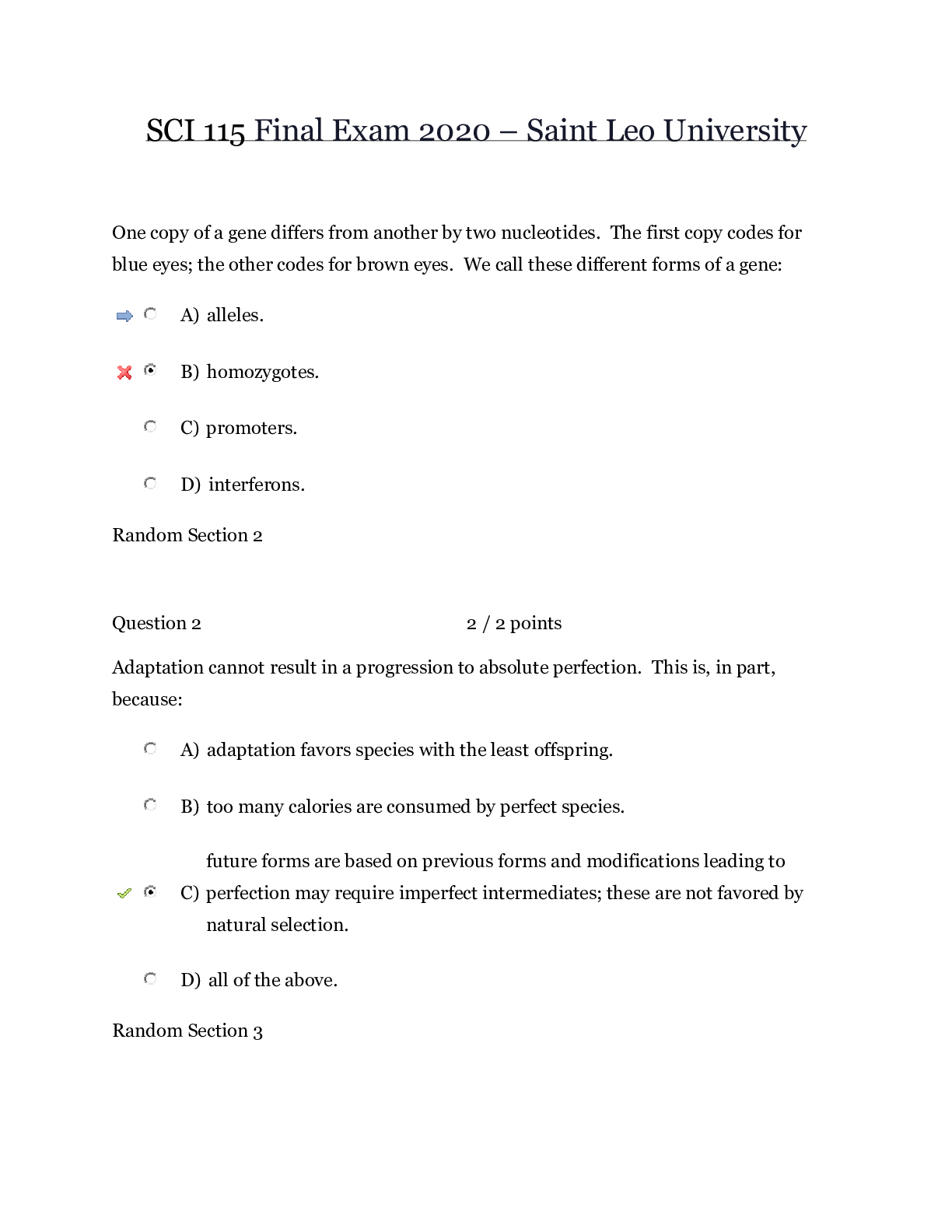
 – Strayer University.png)
 – Strayer University.png)
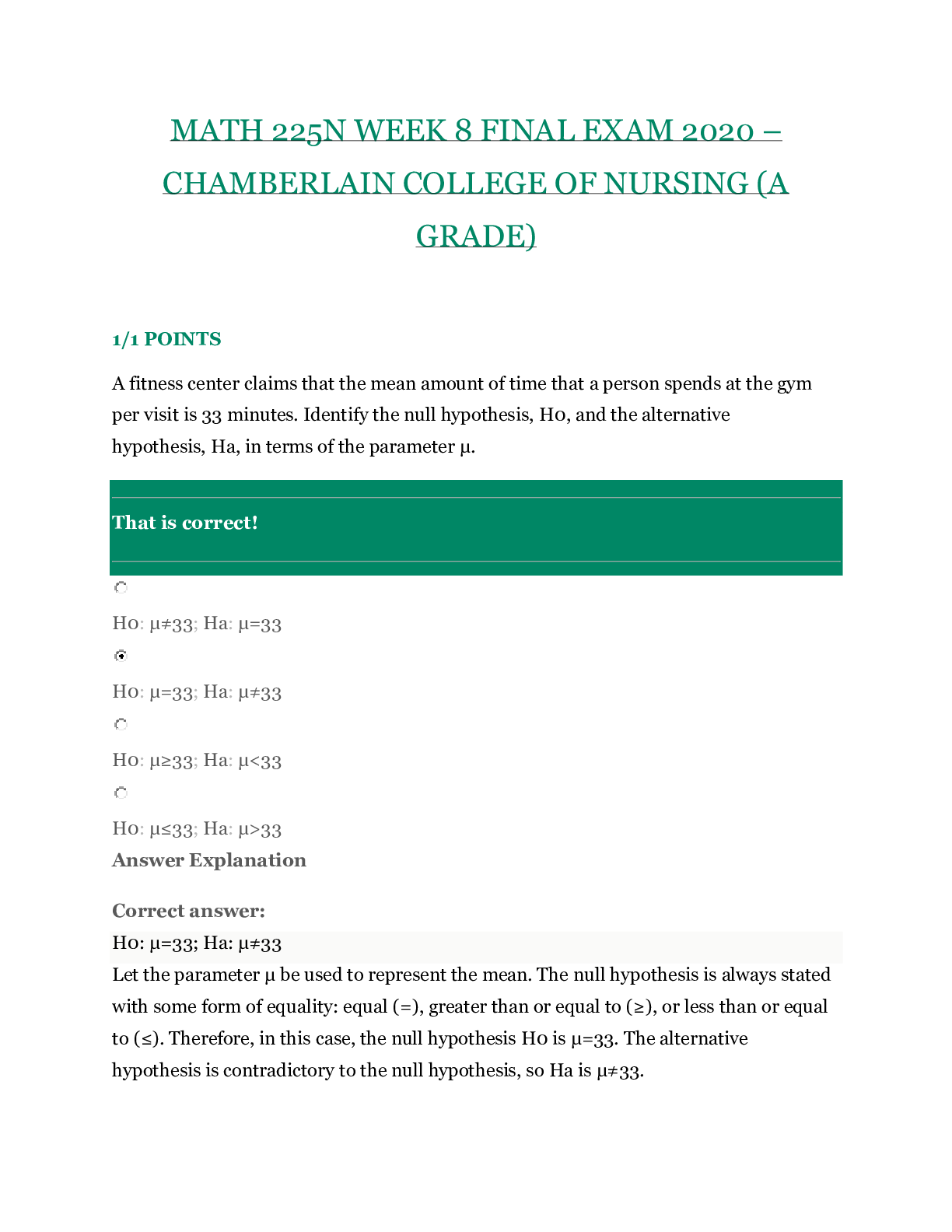
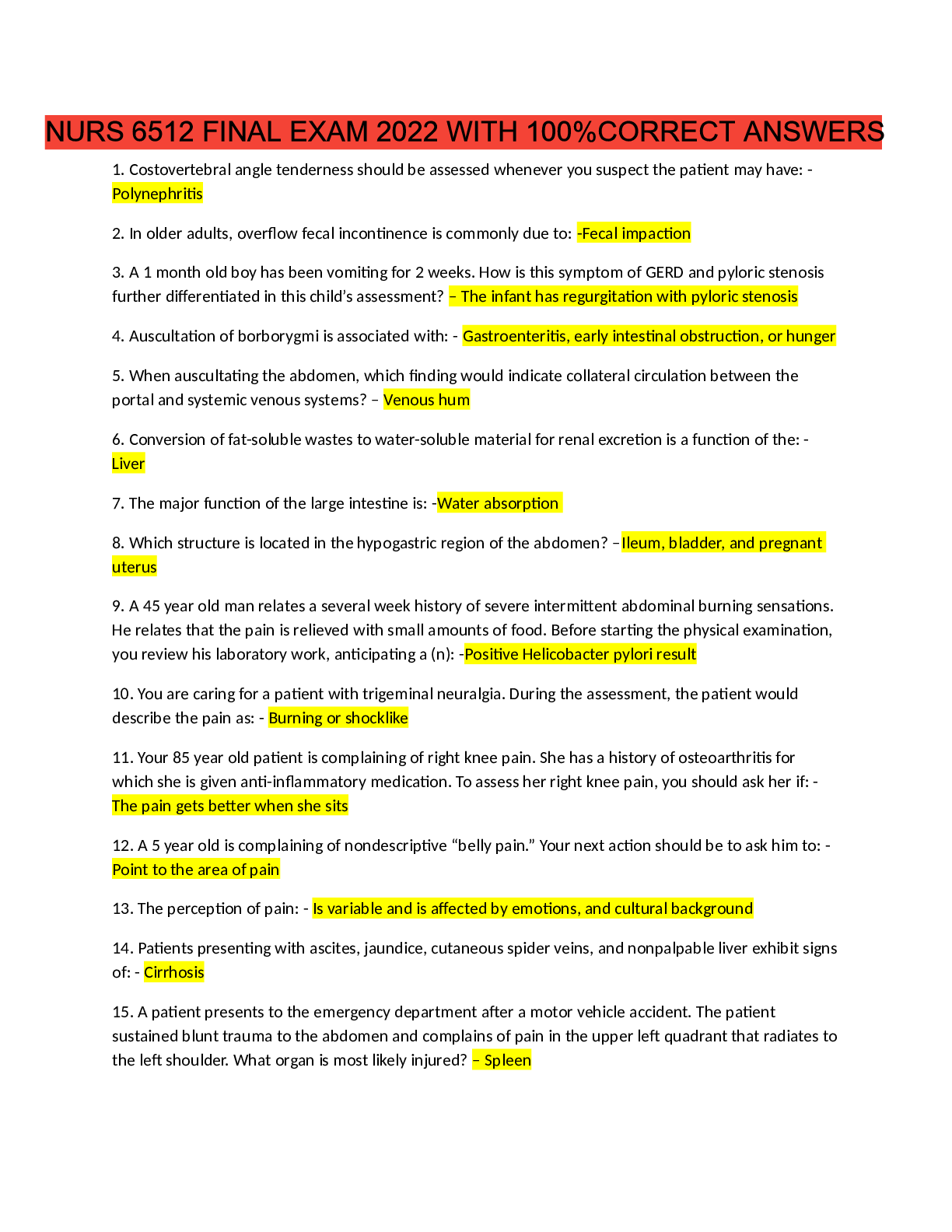
.png)
